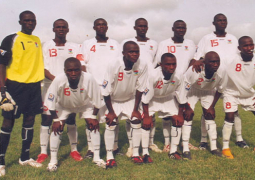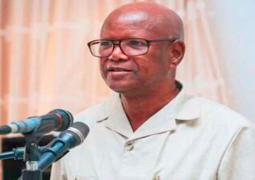The permanent secretary at the Ministry of Agriculture, Baboucarr Njie, on behalf of the Deputy Minister of Agriculture, Hon. Kalifa Kambi, recently launched the Sustainable Land Management Project (SLMP) funded by the Global Environmental Facility (GEF), at the Paradise Suites Hotel in Kololi.
The immediate development objective of the project is to facilitate the resource poor community in The Gambia to alleviate poverty and food insecurity by preventing and reversing declining land productivity through a community-based participatory approach to watershed/landscape management planning and development.
Speaking at the launching ceremony, PS Njie said the launching of the SLMP marks the beginning of the implementation of The Gambia’s component of the GEF.
He noted that Participatory Integrated Watershed Management Project (PIWAMP), the host project for GEF, is co-financed by the Government of The Gambia (GoTG), IFAD and the AfDB.
“PIWAMP has a demand-driven integrated watershed development approach to plan, manage and address our natural resources degradation problems,” he said.
Land degradation is one of the major factors to agricultural production and increased food security, he says, adding that it also has both local and global environmental consequences, thus giving the acute factor that necessitated an agreement from the GEF to complement the GoTG/IFAD/AfDB investment in PIWAMP.
“The incremental GEF investments are aimed at ensuring that PIWAMP interventions contribute to the realization of optimal global environmental benefits including reducing land degradation, conserving biodiversity and improving the adaptive response to climate change,” PS Njie said.
As a way of addressing the critical land degradation issues in The Gambia, he explained, the Government of The Gambia, during the design of the GEF component of PIWAMP indicated that it also wanted the GEF incremental funding to support SLM-related interventions in all the six Agricultural Regions in the country.
According to PS Njie, the target group for the GEF component will be the same as PIWAMP, which is the poor smallholders, dependent on traditional upland crops and lowland rice cultivation as their main source of livelihood.
Women being the dominant rice producers in the country and men the producers of cereal crops, he also notes, the primary target group in the lowlands for the GEF supported SLM interventions in the lowlands will be women and those aimed in the uplands will be the men.
PS Njie told agriculturalists that the financial supervision of the GEF will be carried out by the AfDB while the technical supervision will be conducted by the intervention fund for IFAD.
The proposed GEF-supported activities and tasks have been grouped into three broad project components, namely SLM, community-based watershed/landscape management, and project management, he said.
PS Njie concluded his speech by thanking on behalf of the Government of The Gambia the AfDB and IFAD for funding the GEF project.
Timothy Mkandawire, Financial Management Specialist and Mission leader of the ADB, in delivering a statement on behalf of Ms Paxina Chileshe, Task Manager of PIWAMP and SLMP, said the grant agreement was signed on 17 December 2010 and the “first disbursement for the project is expected this month”.
“The project is an illustration of partnership in development among our institutions and the Government of The Gambia,” Mr Mkandawire said.
“The project is expected to result in environmental and socio-economic benefits through investments in Sustainable Land Management interventions aimed at restoring, sustaining and enhancing the protective and productive functions of the lowland and upland ecosystems.”
He also said the SLMP will add to the Bank’s contribution to the agriculture sector in The Gambia, which includes Peri-urban diary and horticulture, the multinational NERICA dissemination project which aims to enhance rice production and rice import substitution through technology transfer, production support, and capacity building of farmers and extension workers.



